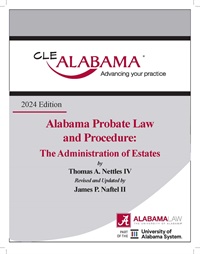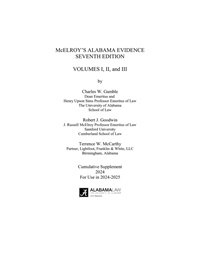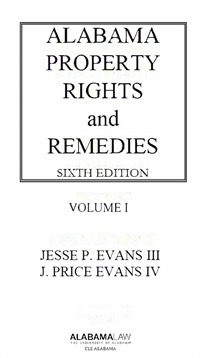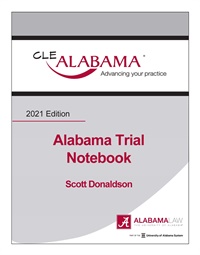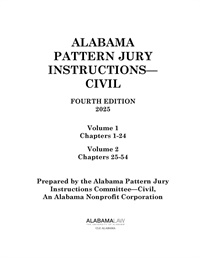Allen v. Milligan: The Intersectionality of Race, Elections and Democracy
Total Credits: 6 including 5 CLE, 1 Ethics
- Average Rating:
- Not yet rated
- Categories:
- Election Law
- Faculty:
- Emily Rong Zhang | Justin Levitt | Daniel Tokaji | Cynthia Almond | Christopher England | Evan Milligan | Michael Li | Michael T. Morley | Jess Unger | Joyce Vance | Jerome Dees | Jennifer Taylor | 2 more....
- Format:
- Audio and Video
- Original Program Date:
- Feb 16, 2024
- License:
- Access for 90 day(s) after purchase.
Description
This symposium explores the history of the Voting Rights Act — an Act with deep ties to the state of Alabama — and considers the changing landscape of election law. The keynote speaker, Evan Milligan, will provide especially enriching commentary on the intersectionality of election law and race. Mr. Milligan, as the named representative plaintiff in Allen v. Milligan, brings a unique personal perspective on these issues. The Symposium will include panels of government officials, litigants, and academics in an effort to provide as complete an analysis as possible of this complex issue. In the current political environment, questions surrounding the franchise are more salient than ever.
Handouts
| Seminar Handout (2.1 MB) | 165 Pages | Available after Purchase |
Faculty

Emily Rong Zhang Related Seminars and Products
Berkley Law
Professor Zhang received her PhD in Political Science in 2022 from Stanford University and her JD. From Stanford in 2016. She serves as an Assistant Professor of Law at Berkley Law. Before joining Berkley, she was a Skadden Fellow at the ACLU Voting Rights Project. Her areas of expertise include civil procedure and litigation, election law and racial and social justice.

Justin Levitt Related Seminars and Products
A nationally recognized scholar of constitutional law and the law of democracy, Professor Justin Levitt has returned to Loyola after serving from 2021-22 as the White House's first Senior Policy Advisor for Democracy and Voting Rights. There, within a team devoted to racial justice and equity, Levitt assisted the President in his efforts to make sure that every eligible American has secure, reliable access to a meaningful vote; to provide equitable representation in government; to restore trust in a democracy deserving of that trust; and to bolster avenues by which Americans build community and engage in civic participation. Levitt had previously served in federal government as a Deputy Assistant Attorney General in the Civil Rights Division of the U.S. Department of Justice. At DOJ, he primarily supported the Civil Rights Division’s work on voting rights and protections against employment discrimination (including federal statutory protections against workplace discrimination based on race, ethnicity, sex -- including pregnancy, sexual orientation, and gender identity -- religion, national origin, citizenship status, and military service). Levitt served in various capacities for several presidential campaigns, including as the National Voter Protection Counsel in 2008, helping to run an effort ensuring that tens of millions of citizens could vote and have those votes counted. Before joining the faculty of Loyola Law School, he was counsel at the Brennan Center for Justice at NYU School of Law, for five years. He also worked as in-house counsel to the country's largest independent voter registration and engagement operation, and at several nonprofit civil rights and civil liberties organizations. Levitt served as a law clerk to the Honorable Stephen Reinhardt of the U.S. Court of Appeals for the Ninth Circuit. He holds a law degree and a masters degree in public administration from Harvard University, and was an articles editor for the Harvard Law Review. He is admitted to the bar in California, New York, and the District of Columbia, and to the U.S. Supreme Court, the U.S. Courts of Appeal for the Fourth Circuit, Ninth Circuit, and Eleventh Circuit, and the U.S. District Court in the Central District of California.
Daniel Tokaji Related Seminars and Products
University of Wisconsin-Madison School of Law
Dean Tokaji became Dean of the University of Wisconsin Law School in 2020. From 2003 to 2020, he was on the faculty at Ohio State University, where he served as Associate Dean for Faculty and Charles W. Ebersold & Florence Whitcomb Ebersold Professor of Constitutional Law. He has taught a wide variety of courses, including Civil Procedure, Civil Rights Lawyering, Comparative Constitutional Law, Election Law and Voting Rights, Federal Courts, First Amendment, Legal Analysis and Writing, Legislation and Regulation, and the U.S. Legal System. He has also taught at Harvard Law School, Hong Kong University, and Oxford University. A leading authority in the field of Election Law, Dean Tokaji’s scholarship addresses questions of voting rights, free speech, and democratic inclusion. He has published over 50 law review articles, book chapters, and other scholarly papers on a wide range of topics. His recent work includes "Election Law, Democracy, and Legal Education" in Beyond Imagination? The January 6 Insurrection (2022), “Voter Registration in a Pandemic,” University of Chicago Law Review Online (2020), “Denying Systemic Equality: The Last Words of the Kennedy Court,” Harvard Law & Policy Review (2019), and “Gerrymandering and Association,” William & Mary Law Review (2018). He is the author of Election Law in a Nutshell (2d ed. 2016), and co-author of Election Law: Cases and Materials (7th ed. 2022). His recent scholarship addresses the challenges facing democracies around the globe, including the free speech issues surrounding digital disinformation, the need for trustworthy electoral institutions, and the role of law schools in strengthening democratic governance.
Media have frequently relied on Dean Tokaji’s expertise on election law, voting rights, and free speech issues. He has been quoted or interviewed by the New York Times, Wall Street Journal, Washington Post, and National Public Radio, and many other outlets. Dean Tokaji graduated summa cum laude from Harvard College, with an A.B. degree in English and American Literature and Language and Philosophy, then earned a J.D. from Yale Law School. Dean Tokaji clerked for the Honorable Stephen Reinhardt of the Ninth Circuit Court of Appeals. A former civil rights lawyer, he has brought many free speech, racial justice, and voting rights cases over his career.

Cynthia Almond Related Seminars and Products
Cynthia Lee Almond LLC
Cynthia was born and raised in Tuscaloosa. She graduated from Central High School and then attended Vanderbilt University. She received a Bachelor of Arts from The University of Alabama, majoring in History and minoring in Spanish, and she also received her Juris Doctor from The University of Alabama School of Law. Cynthia is an attorney in the private practice of law where she concentrates in estate planning and probate, business law, and real estate. She also owns a title company, Capitol Park Title.
In 2021, Cynthia was elected to the State of Alabama House of Representatives for District 63 in Tuscaloosa. She currently serves as Chair of the Tuscaloosa County Local Legislative Delegation and as a member of the Ways and Means Education Committee, the Judiciary Committee, Rules Committee, and serves as Vice-Chair of Ethics and Campaign Finance Committee. Previously, she served four terms on the Tuscaloosa City Council where she was elected by her peers as President Pro Tem of the council and served as Chair of the Finance committee. She is a graduate of Leadership Alabama and Co-Chair for its West Alabama Regional Council; she serves on the Capstone Health Services Foundation and on its Finance Committee, the Hank Poore Foundation, Immediate Past Chair of the State Bar Association’s Real Property/Probate/Trust section, and the BankFirst Advisory Board; and she is a member of and serves as a Sunday School teacher at First United Methodist Church. She previously served on and Chaired the West Alabama Regional Commission, and she also served on the Tuscaloosa County Tax Board. Cynthia has two children, Lee and Miller. In her spare time, Cynthia enjoys playing the piano, tennis, walking, running, mountain bike riding, kayaking, and most any other outdoor activity!

Christopher England Related Seminars and Products
City Attorney's Office
Mr. England is a graduate of Washington D.C.’s Howard University with degrees in Political Science and English. He received his Juris Doctor from The University of Alabama School of Law in 2002. As a former assistant district attorney, Mr. England headed District Court prosecutions which included administering arraignments, trial and preliminary hearing dockets; represented the State of Alabama by way of the District Attorney’s Office in dependency and child in need of supervision (CHINS) hearings; tried numerous cases and handled seventy-two hour hearings in Juvenile Court; handled numerous hearings including preliminary, suppression, bond and revocation hearings. As an associate city attorney, Mr. England conducts training sessions for Law Enforcement involving Fourth, Fifth, and Sixth Amendment issues; drafts contracts and funding agreements for various departments within the City of Tuscaloosa; analyzes and investigates claims against the City of Tuscaloosa; drafts resolutions to be presented to the City Council; and defends the City of Tuscaloosa in regulatory complaints from other government agencies such as the Environmental Protection Agency. In his role as a State Representative, Mr. England is involved in generating budget for the Alabama Education Trust Fund and General Fund; is responsible for identifying and securing funding for various programs within District 70 and Tuscaloosa; engages in fundraising and public policy creation; is vice minority Whip of the Alabama Democratic Party, vice chair of the Tuscaloosa County Legislative Delegation, and a member of the Judiciary, Public Safety, and local Legislation committees.

Evan Milligan Related Seminars and Products
Alabama Forward
Evan Milligan is the executive director of Alabama Forward, a statewide civic engagement table advancing efforts of nonpartisan organizations throughout Alabama to expand the voter base, protect voting rights, and make election systems as accessible as possible. He and his wife Jennifer have two children Ruby, 4, and Elijah, 1.

Michael Li Related Seminars and Products
Brennan Cemter
Michael Li serves as senior counsel for the Brennan Center’s Democracy Program, where his work focuses on redistricting, voting rights, and elections. Prior to joining the Brennan Center, Li practiced law at Baker Botts L.L.P. in Dallas for ten years. He was the author of a widely cited blog on redistricting and election law issues that the New York Times called “indispensable.” He is a regular writer and commentator on election law issues, appearing on PBS Newshour, MSNBC, and NPR, and in print in the New York Times, Los Angeles Times, USA Today, Roll Call, Vox, National Journal, Texas Tribune, Dallas Morning News, and San Antonio Express-News, among others.
In addition to his election law work, Li previously served as executive director of Be One Texas, a donor alliance that oversaw strategic and targeted investments in nonprofit organizations working to increase voter participation and engagement in historically disadvantaged African American and Hispanic communities in Texas. Li received his JD with honors from Tulane Law School and an undergraduate degree in history from the University of Texas at Austin.

Michael T. Morley Related Seminars and Products
Florida State University College of Law
Professor Morley joined FSU Law in 2018, and teaches and writes in the areas of election law, constitutional law, remedies, and the federal courts. His research focuses on election emergencies, the constitutional right to vote, and the Electoral Count Act, as well as the equitable powers of the federal courts. He is an elected member of the American Law Institute and serves as an advisor for the ALI’s Restatement of Torts: Remedies project. Professor Morley is a member of the Florida Advisory Committee for the U.S. Commission on Civil Rights, and was the 2021 Chair of the AALS Section on Election Law. He has testified before congressional committees, made presentations to election officials for the U.S. Election Assistance Commission, and participated in bipartisan blue-ribbon groups to develop election reforms. The Governor of Florida also appointed Professor Morley to the Criminal Punishment Code Task Force to propose potential revisions to the legislature.
Professor Morley’s work has been published in many of the nation’s top law reviews, including the Georgetown Law Journal, Virginia Law Review, and Northwestern University Law Review. The U.S. Supreme Court has cited Professor Morley’s articles, and he was counsel of record for the successful Petitioner in a landmark campaign finance case. Professor Morley has appeared on C-SPAN, Court TV, Fox News and numerous local news programs, and has been quoted in The Washington Post, Los Angeles Times, Roll Call, Politico, U.S. News & World Report, and a wide range of other national publications. Before joining FSU Law, Professor Morley was a Climenko Fellow and Lecturer on Law at Harvard Law School. Prior to his experience in academia, he served in government as Special Assistant to the General Counsel of the Army at the Pentagon, as well as a law clerk for Judge Gerald B. Tjoflat of the U.S. Court of Appeals for the Eleventh Circuit. During his tenure with the Army General Counsel’s office, he was awarded the Meritorious Civilian Service Award and the Army Staff Lapel Pin. He also worked as an associate at Williams & Connolly LLP and the Critical Motions & Appeals group of Winston & Strawn, LLP, both in Washington, D.C. Professor Morley earned his J.D. from Yale Law School in 2003, where he was a senior editor on the Yale Law Journal; served on the moot court board; and received the Thurman Arnold Prize for Best Oralist in the Morris Tyler Moot Court of Appeals.

Jess Unger Related Seminars and Products
Southern Poverty Law Center
Jess Unger serves as Senior Staff Attorney for voting rights with the Southern Poverty Law Center. He received his BA in Political Science and Government from Sarah Lawrence College and his J.D. in 2016 from Georgetown University Law Center.

Joyce Vance Related Seminars and Products
The University of Alabama School of Law
Joyce White Vance is a Distinguished Visiting Lecturer in Law. She served as the U.S. Attorney for the Northern District of Alabama from 2009 to 2017. She was nominated for that position by President Barack Obama in May of 2009 and unanimously confirmed by the Senate in August of 2009. Professor Vance served on the Attorney General’s Advisory Committee and was the Co-Chair of its Criminal Practice Subcommittee. As U.S. Attorney, she was responsible for overseeing all federal criminal investigations and prosecutions in north Alabama, including matters involving civil rights, national security, cybercrime, public corruption, health care and corporate fraud, violent crime and drug trafficking. She was also responsible for affirmative and defensive civil litigation on behalf of the government and for all federal criminal and civil appeals.
Before becoming U.S. Attorney, Professor Vance served as an Assistant United States Attorney in Birmingham for 18 years. She spent ten years as a criminal prosecutor, before moving to the Appellate Division in 2002. She became the Chief of that Division in 2005. Prior to her work as a federal prosecutor, she spent six years as a litigator in private practice, first at Arent, Fox, Kintner, Plotkin & Kahn in Washington D.C., and then at Bradley, Arant, Rose & White, now Bradley, Arant, Boult & Cummings, in Birmingham. Professor Vance received a B.A. from Bates College in Lewiston, Maine, magna cum laude, and a J.D. from the University of Virginia School of law.

Jerome Dees Related Seminars and Products
Southern Poverty Law Center
Mr. Dees serves as Policy Director for the Southern Poverty Law Center. He received his B.A. n Classical and Ancient Studies from The University of Florida and his J.D. from The University of Alabama School of Law.

Jennifer Taylor Related Seminars and Products
Yale Law School
Jennifer Taylor is a Lecturer in Law, Clinical Lecturer in Law, Associate Research Scholar in Law, and Executive Director of the Arthur Liman Center for Public Interest Law at Yale Law School. From 2010 to 2022, Taylor served as an Attorney at the Equal Justice Initiative (EJI) in Montgomery, Alabama, where she represented incarcerated and indigent clients and litigated challenges to abusive conditions of confinement, capital punishment, wrongful conviction, and excessive sentencing. She also spearheaded narrative content for exhibits in The Legacy Museum: From Enslavement to Mass Incarceration and The National Memorial for Peace and Justice; led research and writing that yielded multiple public education reports on racial history and mass incarceration; and supported community engagement through the Community Remembrance Project. Taylor served as a Visiting Researcher at the Wits Justice Project in Johannesburg, South Africa for several months in 2014–2015, and she interned with the NAACP Legal Defense Fund as a law student. A 2010 graduate of Yale Law School, Taylor took part in the Prison Legal Services and New Haven Legal Assistance Clinics and co-convened the Liman Workshop. She received an M.S. in Journalism from Columbia University and a B.A. in Comparative Studies in Race and Ethnicity from Stanford University.

Bryan Fair Related Seminars and Products
The University of Alabama School of Law
After earning his undergraduate degree from Duke and law degree from UCLA, Professor Fair worked as an associate with Bryan, Cave, McPheeters & McRoberts in Los Angeles. In 1987, he joined the UCLA law faculty as a Lecturer and co-directed its Academic Support Program. He served as a commissioner of the California State Bar Commission on Minority Access to the Legal Profession and as a Public Counsel legal services volunteer.
Professor Fair joined the Alabama law faculty in 1991. He was named the Thomas E. Skinner Professor of Law in 2000. He is a frequent member of the law school commencement hooding team (selected by students) and has been named the law school’s Outstanding Faculty Member (selected by students) multiple times. He has also received the University’s Outstanding Commitment to Teaching Award given each year by the National Alumni Association. Professor Fair has served as the faculty advisor to the Jessup International Moot Court Team, Black Law Students Association, Outlaw, Law Democrats, American Constitution Society, and other student groups. Professor Fair has also taught law courses at Seattle University, the University of Tennessee, the University of Fribourg, Switzerland, and The Australian National University.
Professor Fair has held several administrative posts at the Law School and the University. At the Law School, from 1997 to 2010, he directed the University of Fribourg/UA Law cooperative exchange (the Swiss Program). He served as the Director of Diversity and International Programs in 2007, 2011, and 2012, and Associate Dean for Special Programs from 2008-2010, supervising international, diversity, and public interest programs. He also served as an Assistant Vice President for Academic Affairs at the University from 1994 to 1997. Professor Fair is the author of Notes of a Racial Caste Baby: Colorblindness and the End of Affirmative Action (NYU Press 1997), and numerous articles on inequality in the United States. Professor Fair’s research agenda remains focused on equality theory under the Fourteenth Amendment, with the central theme that equal protection jurisprudence has lost its anti-caste moorings, rendering it largely obsolete to address significant forms of American caste. He is a member of the American Law Institute and has served on ABA, AALS, and LSAC committees. He has served on numerous boards, including the Southern Poverty Law Center, Equal Justice Initiative, and Alabama Appleseed.

Daiquiri Steele Related Seminars and Products
The University of Alabama School of Law
Daiquiri Steele, J.D., Ph.D. serves as an Assistant Professor of Law. She teaches Civil Rights, Employment Discrimination, Employment Law, Labor Law, Education Law, Torts, and Legislation & Regulation. Her research examines whether and how anti-discrimination laws help ensure equal access to employment and education, both of which are crucial determinants of socioeconomic mobility. Her work focuses specifically on anti-retaliation and whistleblower law. Her scholarship has been published or is forthcoming in the Michigan Law Review, Northwestern Law Review, UC Irvine Law Review, Washington Law Review, Berkeley Journal of Employment and Labor Law, and Boston University Law Review.
Professor Steele originally joined The University of Alabama School of Law in a hybrid administrative/faculty role as Director of Diversity & Inclusion and Assistant Professor of Law in Residence in 2016. From 2019-2021, she served as a Forrester Fellow at Tulane University Law School before rejoining the Alabama Law faculty.
Professor Steele formerly served as a Civil Rights Attorney with the U.S. Department of Education, where she provided legal counsel relating to federal investigations of discrimination involving the nation’s school districts, colleges, universities, and state educational agencies. She also served as a mediator for civil rights claims. She previously worked for the U.S. Department of Labor, Office of Federal Contract Compliance Programs, where she assessed federal contractors’ compliance with employment discrimination laws.
Professor Steele serves as Chair of the Association of American Law Schools (AALS) Section on Labor Relations and Employment Law, a Fellow of American Bar Association (ABA) Section of Labor & Employment Law, and a Council member of the ABA Section of State Local Government Law. She previously served as Chair of the AALS Section on Employment Discrimination Law, a Commissioner on the ABA Commission on Racial & Ethnic Diversity in the Profession, a member of the ABA Standing Committee on Public Education, Diversity Director for the ABA Young Lawyers Division (YLD), Assembly Speaker/Chief Policy Officer for the ABA YLD, Director of ABA Involvement for the State Bar of Georgia YLD, and a member of the Alabama State Advisory Committee to the U.S. Commission on Civil Rights.
She is an American Bar Foundation Fellow, a graduate of the Georgia Young Lawyers Division Leadership Academy, a recipient of the National Bar Association 40 Under 40 Best Advocates Award, a recipient of the Award of Achievement for Outstanding Service to the Profession by the State Bar of Georgia YLD, and an ABA On The Rise Top 40 Young Lawyers Award recipient.
She graduated with Bachelors of Arts degrees in both Economics and Political Science from Spelman College where she was inducted into the Phi Beta Kappa Society. She earned her Juris Doctor from the University of Georgia School of Law, her Masters degree in Public Policy and Administration from Northwestern University, and her Ph.D. in Business Administration from Hampton University. She is a member of the Board of Directors for Girls Inc. of Central Alabama, Heart Gallery Alabama, and Kids Play Alabama.


